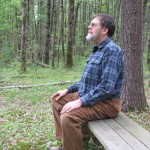I’m writing this entry from back in my dorm room, which is cool and quiet. I’m missing the scheduled worship-sharing group I was assigned to, and I certainly hope I can join them tomorrow. But I have reached the heatrash stage of energy overload, and it was time to take a break. I’m not sure if blogging is really “taking a break”–I might be wiser to go lie down under a tree. Though, if I did that, I’d probably fall asleep, and I really, really want to make the workshop I’m scheduled for in about an hour.
Anyway, there are oak trees rustling right outside my open window, and I can hear the shrilling of cicadas… and it’s shady and quiet and calm here. So I think this is good.
I’m not entirely sure I will post this entry–I’m not entirely sure of the ethics of it. I’m often at a loss to tell what the boundaries are around talking about what happens in Quaker meetings. They are so intimate, that the fact that they are open seems beside the point. I understand (intellectually, at least) that minutes and epistles are written the way they are, with so little reference to individuals, in part because they are supposed to reflect, not the ideas and actions of individuals, but the movement of spirit among the whole meeting. I am confused, though, about what it’s OK to talk about on the level of individuals, and what it isn’t. This story is one of those confusing cases.
As I mentioned yesterday, the worship element in meeting for business has been, at least to my mind, quite deep and rich. Today, though, it seemed to me that we were less centered in our business meeting, and I think it showed in the quality of the questions and comments made from the floor. There seemed to be less deep listening and discernment, and more people speaking in what seemed like set patterns. Perhaps other people, like me, are hitting the wall in terms of energy levels. Of course, it could be that I’m tired, and so I’m not picking up on the depth that is there… but for whatever reason, it seemed that we were less centered today in our work.
Again, for the Pagans in the audience, may I just say that conducting business as what we would call ritual is an extraordinary experience? I know that there are some groups that are experimenting with things like it, having designated people who do aspecting or grounding work during a long meeting. I imagine that’s something like the work of “holding” a meeting as Quakers sometimes do.
In any case, we seemed less focused and spiritually grounded today than yesterday. The meeting still went reasonably well, and there were moments that were very good, particularly when, at the end of the agenda, we reached the memorial minutes. This is another practice I think would translate well to Pagan settings. Just as, at Samhain, many groups celebrate the ancestors who have died during the year, NEYM is reading memorial minutes, written by the monthly meetings of members who have died in the past year. They have, so far, been quite moving, focusing as they have on lives lived so fully and so well. And after each minute, members settle into silence, and messages may rise relating to the minute or about the life being celebrated.
————————————————————————-
There was a good deal more here. Towards the end of the meeting, some troubling messages rose, and it seemed to me that, because the group was less centered in worship, we did less well at sitting with those messages in a helpful way. I know that at least some people did walk away hurt.
Initially, I wrote up the story with a good bit of concreteness. That’s part of being a good writer–making a story real, even though of course it will remain subjective. But anything published on the web should be assumed to be about to be viewed by the very people you would least like to see it. I was troubled about the entry, feeling that it was good writing (or would be, once I’d given it a once over for copy editing), but also feeling that some of those in attendance at yesterday’s meeting might be hurt by reading my words.
I get a lot out of reading other people’s stories, when they are True (not just factual, but candid and coming from a deep and real place) and I don’t think there are enough stories of simple experience in either the Pagan or the Quaker world. Pagans tend to write “how to” manuals, and Quakers often write in an almost disembodied way. It feels like Quakers sometimes, in an effort to transcend the merely personal, wind up writing bland and sanitized text. The exceptions are there, and they can be breathtaking. And it’s not that I don’t see the point of being careful with words that could hurt what are, after all, members of my community… nor of reaching for ways to express the experiences of discernment and worship that go beyond individual experience. But I _am_ a Pagan. When Liz Opp writes about placing God at the center of her expectations for Yearly Meeting, rather than herself, my mind goes blank. I just don’t get that one–though I respect that it makes sense for her. For me, though, one of the implications of immanent divinity is that my own fallible, subjective, unpolished human perspective is precious, to the world as well as to myself.
I have grown a good deal over the years through stories that I’ve been told that named the names and left in even the embarassing stuff. Pagans can be difficult, quarrelsome people, but I also think that the Pagan tendency to tell stories–which might be called gossiping–is often a strength. People do get hurt at times–but they also grow, and grow to know one another in ways they might otherwise not.
However, as I said, I was troubled. And the cool thing about being at a gathering of 600 or so Quakers is that a number of my Quaker friends are handy to talk with. Peter and I went off and found Nancy, who agreed to come back to my room and read through what I’d written, and help me figure out whether or not it was reasonable to publish it. (OK, OK–the Quakerese is “find clearness”. But sometimes I like plain English…)
She shared my concerns, actually more strongly than I did. She also suggested that, if I wanted to communicate with the people who were involved in the incident that troubled me, I should do so directly, face to face–that it would be hurtful to come across my description accidentally online, which I can’t disagree with. I knew I did not feel any prompting to talk to the people involved directly on the subject. So, with some ambivalence, I decided not to go into detail on the story, leaving instead all of these probably annoying generalizations.
The story of what I observed in the meeting for business is my story… but it’s not just my story. I am clear that it is valuable, and maybe vital, for humans to tell their stories. But I am not clear on where the lines ethically need to be. So I’m not giving much information here outside my subjective responses. Perhaps it makes for dull writing, which is too bad, but it’s all I feel clear to do today.
My other lingering discomfort is that I probably talked poor Nancy’s ear off. I hope not–good listeners deserve not to be used up by overly gabby folks like me. But that I do feel I can ask about face to face. Hoping that Nancy did not feel used or used up by the amount of her time and energy I took up with this yesterday, we will, perhaps, have created the kind of stronger bond of friendship that _good_ gossip–the kind that’s really truth telling, with open hearts–can bring people sometimes.
I do know that I’m learning a lot here this week, about the reasons not to speak in worship, without carefully testing a leading to speak. Where to draw those lines outside of worship, whether in the context of the Ministry and Worship committee, or in this blog, is much more confusing to me.















